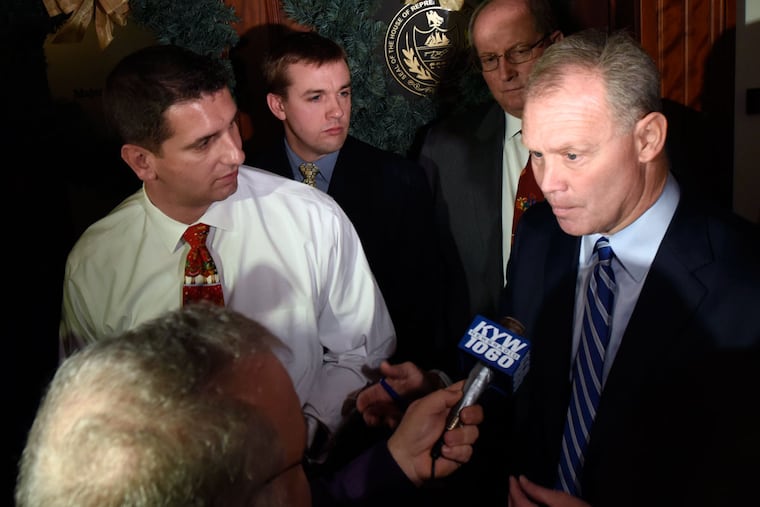Capitol empties as Pa. budget deal collapses
HARRISBURG - For two whirlwind days, lawmakers tried a flurry of last-ditch maneuvers to end the historic budget gridlock and enact some version of a state spending plan.

HARRISBURG - For two whirlwind days, lawmakers tried a flurry of last-ditch maneuvers to end the historic budget gridlock and enact some version of a state spending plan.
But by Wednesday night, the Capitol had emptied, presumably for the holiday weekend, with no clear resolution in sight.
Again.
Earlier in the day, the Senate unexpectedly broke from its agreement with Gov. Wolf to back a $30.8 billion spending plan that included an unprecedented infusion of money for schools. Senators instead approved a scaled-down House budget proposal that their leaders had once rejected, and sent it to Wolf's desk.
The governor vetoed a similar plan in June. As Wednesday ended, it remained unclear whether he would do so again, which could extend the impasse that has left many schools, nonprofits, and county governments on the brink of running out of cash. Wolf has 10 days to act.
"We must continue our fight for historic education funding," he said in a statement while offering no clues to his next step.
The twists and turns Wednesday came just one day after the so-called framework agreement between the Democratic governor and Senate Republicans seemed to be headed toward final approval by the House. But it was derailed by continuing disputes over how to change the state pension system and what taxes will fund any spending increase.
The nearly six-month budget stalemate is now the longest in modern state history. No one in the Capitol seemed certain when lawmakers might return or how discussions might get back on track.
Neither chamber scheduled voting sessions. Lawmakers instead were placed on a six-hour callback notice. Some privately wondered whether they would return before the end of the year.
The Senate's shift toward accepting the $30.2 billion House spending plan was a dramatic reversal from weeks ago. After the House passed that plan, the Senate gutted it and replaced it with the $30.8 billion plan that Wolf supports. It includes $350 million in new school funding, far more than the House plan.
Senate Majority Leader Jake Corman (R., Centre) said Wednesday that "we had hoped to continue the framework process," but that there were few options left given the disagreements among all the parties.
"This was the best way, on Dec. 23, to get a budget on the governor's desk that he can sign," he said.
Corman added that Wolf could sign the spending bill and continue negotiations on other budget-related legislation.
Still, that outcome was far different from what most lawmakers expected when they arrived in the Capitol on Wednesday.
The House had been scheduled for a busy session of budget-related votes. Even leaders who opposed the framework expected the action could seal a deal on the agreement.
But the House abruptly adjourned early Wednesday afternoon. Majority Leader Dave Reed (R., Indiana) cited a recurring obstacle: The House would not act until the Senate and Wolf disclosed which taxes they propose to raise or impose.
"We're waiting for a tax package," Reed said. "And if that tax package cannot come to fruition, then it's time for us all to admit we need to take things off the table . . . and pass a budget that's realistic."
Senate President Pro Tempore Joe Scarnati (R., Jefferson), meanwhile, said his chamber would not move the remaining pieces of the budget agreement - including a tax bill - until the House indicated it would approve pension reform legislation.
"If the [pension] votes aren't there, I think reality begins to set in," Scarnati said.
The differing explanations laid bare the tensions that have developed between the Republican-controlled chambers this month, as both sides have wrestled with how to end the stalemate.
Wolf, in his statement, said the Senate "caved to those same House leaders and extreme interests to continue the failed status quo."
Rep. Mike Hanna (D., Clinton), the minority whip, could hardly contain his disappointment.
"The bills could have been voted," he said. "This should be done. This should be done today."
609-217-8305 @cs_palmer